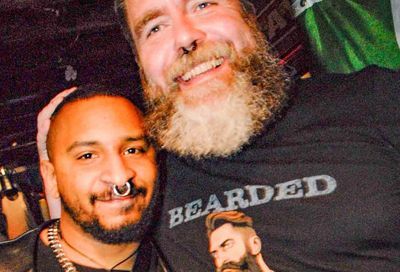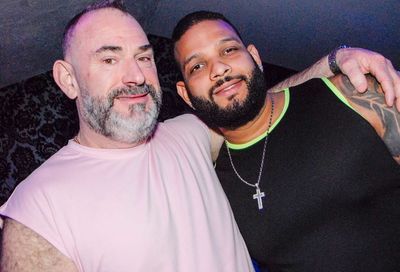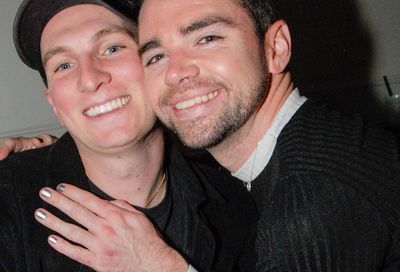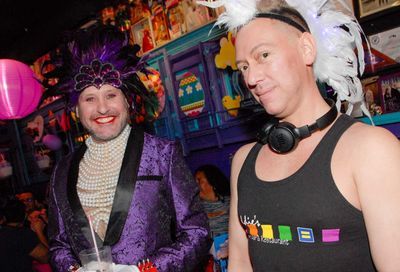Combating Hate Crimes
Commentary: Town Square
On March 14, 2007, a 25-year-old gay man named Ryan Keith Skipper was murdered in Polk County, Fla. He was stabbed 20 times in what the sheriff’s office called a hate crime. Joseph Eli Bearden, 21, and William David Brown Jr., 20, face murder and robbery charges. On April 14, vigils were held in 14 Florida cities and the District of Columbia. Lara Martin, a high school friend of Skipper, organized the vigil in D.C. It was a cold and wet day when fewer than two dozen people gathered at the Dupont Circle fountain to light candles in memory of Skipper and other hate crime victims. Speakers included representatives of the Metropolitan Community Church, the National Black Justice Coalition and the Human Rights Campaign. The following is based on my remarks at that vigil.
On the Hebrew calendar, the sunset following this vigil is the beginning of Yom ha-Shoa, Holocaust Memorial Day. Our victory against the darkness on such a day is to refuse to let a single person be reduced to a number. Ryan Keith Skipper was a precious human being. How can we make our words of mourning real? We cannot bring him back; we can only work to overcome the hate that killed him.
We have to shine more light on injustice, and prick more consciences. The memory of our dead reminds us of what is at stake as we work to make our country live up to its principles. In his first inaugural address, President Lincoln said, ”We must not be enemies,” and appealed to ”the better angels of our nature.” That’s just as tall an order today as it was in 1861. It takes a strong belief in our cause, as well as discipline. It takes many people doing many things, from supporting gay-straight alliances in our schools to creating gay and lesbian liaison units in our police departments like the one here in D.C.
It would be easier to stay within our online affinity groups, virtual communities that pretend to replace the actual communities we live in. But unless we intend to wall ourselves off entirely and plug into the Matrix, we have to deal with our actual neighbors eventually. We cannot solve a problem by hiding from it. Sooner or later, we have to leave our comfort zones and encounter some of the diversity we talk so much about.
The Matthew Shepard Act was recently introduced in Congress. But we have work ahead that no hate crime law can do for us. Moving our society is a much wider task than just law enforcement. In the end, after all, we don’t want to prosecute crimes, we want to prevent them. And while it is fine to press networks to fire shock jocks like Don Imus (since free speech rights do not confer an entitlement to a TV or radio contract), we must also consider their fans. Imus’s listeners were the reason so many public figures went on his program. Firing him does nothing to change their minds or win their votes.
So it is not enough to play defense and focus on victims. We need a good offense. We can only change our society one mind and one heart at a time. To advance, the GLBT movement must be about building community and cultivating relationships with people who are unlike us. Otherwise we are retreating from society, not challenging it.
This is slow work and involves countless difficult conversations. It is fought on many fronts, and there is no map. But that’s the point. New times call for new pioneers. It’s not as if we have to abandon friends with whom we are comfortable. We all need relaxation and replenishment, and we go back to our friends for that. But if that becomes an excuse to avoid discomfort, we are like the local candidate who vacations while his opponent knocks on doors. Sooner or later, we have to get back in the game.
We have to find ways of making our case that will appeal to moderate and conservative voters. We already won over most of the liberals. If we don’t strive to expand the ground for civil discourse, our nation’s poisoned, scorched-earth politics will continue and our cause will suffer. We have to find ways to change minds and hearts before sharp words turn into sharp knives. And whatever we find, we have to share with one another. We are all conscripts in the army to make real the phrase, ”Never again.”
Richard J. Rosendall is a writer and activist whose work has appeared on Salon.com and the Independent Gay Forum. He can be reached at rrosendall@starpower.net.
Support Metro Weekly’s Journalism
These are challenging times for news organizations. And yet it’s crucial we stay active and provide vital resources and information to both our local readers and the world. So won’t you please take a moment and consider supporting Metro Weekly with a membership? For as little as $5 a month, you can help ensure Metro Weekly magazine and MetroWeekly.com remain free, viable resources as we provide the best, most diverse, culturally-resonant LGBTQ coverage in both the D.C. region and around the world. Memberships come with exclusive perks and discounts, your own personal digital delivery of each week’s magazine (and an archive), access to our Member's Lounge when it launches this fall, and exclusive members-only items like Metro Weekly Membership Mugs and Tote Bags! Check out all our membership levels here and please join us today!




















